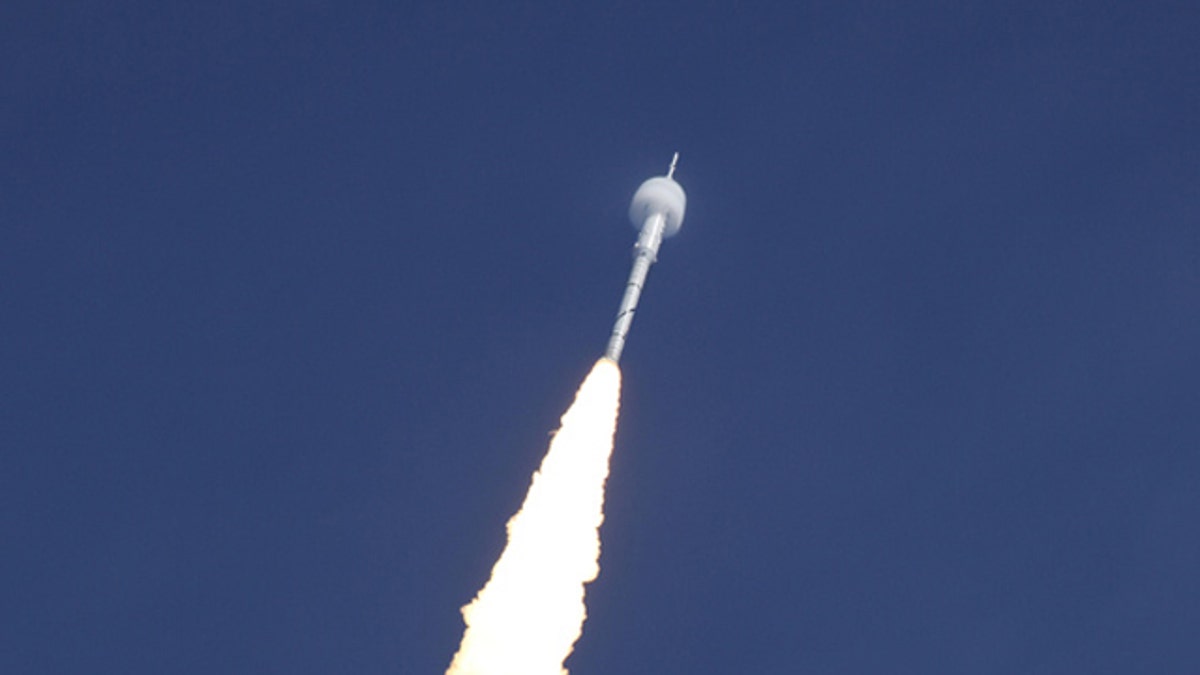
A bow shock forms around the Ares I-X test rocket traveling at supersonic speed during its Oct. 28, 2009 launch from the Kennedy Space Center, Fla. (NASA, courtesy of Scott Andrews)
NASA's Constellation program should replace our aging fleet of space shuttles, which make their last flight in September. But reports indicate Obama may eliminate the program entirely, leaving the U.S. relying on Russian vehicles for space transportation.
Under the Constellation umbrella, NASA has been building the Ares I and Ares V launch vehicles, the Orion crew capsule and the Altair Lunar Lander. The space agency successfully test-launched Ares 1-X on Oct. 28, 2009. The spacecraft were supposed to be perform a variety of missions, from International Space Station resupply to lunar landings.
But according to a report in the Orlando Sentinel, the forthcoming budget — which the president will announce in detail during tonight's State of the Union address — will include no funding for lunar landers, no moon bases, and no Constellation program at all.
Once the shuttle completes its final mission, NASA will have no way of its own to bring men into space or supplies to the Space Station — arguably a hole in our ability to remain competitive in the field of space exploration.
At that point, NASA intends to buy rides for its astronauts on Russian Soyuz vehicles until a new service — either commercial or government — materializes. The Russian government charges NASA $51 million for each seat on its Soyuz vehicles. Last May, NASA announced that the new contract allows it to buy 6 seats on Soyuz craft in 2012 and 2013 for a total of $306 million.
A number of private companies have been competing to build next-generation vehicles capable of transporting humans into space and to the International Space Station. Armadillo Aerospace, Virgin Galactic, SpaceX and others are vying to be the first commercial spacecraft — mainly concentrating on the lucrative space tourism industry.
The budget will include funding for those private companies to develop capsules and rockets that can be used as space taxis, reports the Sentinel. These companies may take astronauts on fixed-price contracts to and from the International Space Station — a major change in the way the agency has done business for the past 50 years.
NASA contractors have already been quietly planning on the end of Ares I, reports the Sentinel, noting that the program is already "years behind schedule and millions of dollars over budget." NASA has already spent more than $3 billion on Ares I and more than $5 billion on the rest of Constellation."
NASA's budget, just over $18.7 billion this year, is still expected to rise again in 2011, reports Space.com, though by much less than the $1 billion increase NASA and its contractors have been privately anticipating since mid-December. A White House-appointed panel, led by former Lockheed Martin chief Norm Augustine, urged these changes on the administration in December.
The panel also said a worthwhile manned space exploration program would require Obama to budget about $55 billion for human spaceflight over the next five years, some $11 billion more than he included in the 2011-2015 forecast he sent Congress last spring.
The Aerospace Safety Advisory Panel's report also cautioned the United States against halting work on the Ares rocket in favor of unproven commercial alternatives. "To abandon Ares I as a baseline vehicle for an alternative without demonstrated capability nor proven superiority (or even equivalence) is unwise and probably not cost-effective," the report stated.
A senior administration official told Fox News that rather than space programs, the president plans to use the address to renew his focus on jobs, calling for swift action on lagging bills providing tax cuts for job creation, new equipment purchases and the elimination of capital gains for small businesses.
The Indian government announced plans this morning to step up its schedule for manned missions to space, targeting 2016 for its first manned launch.








































